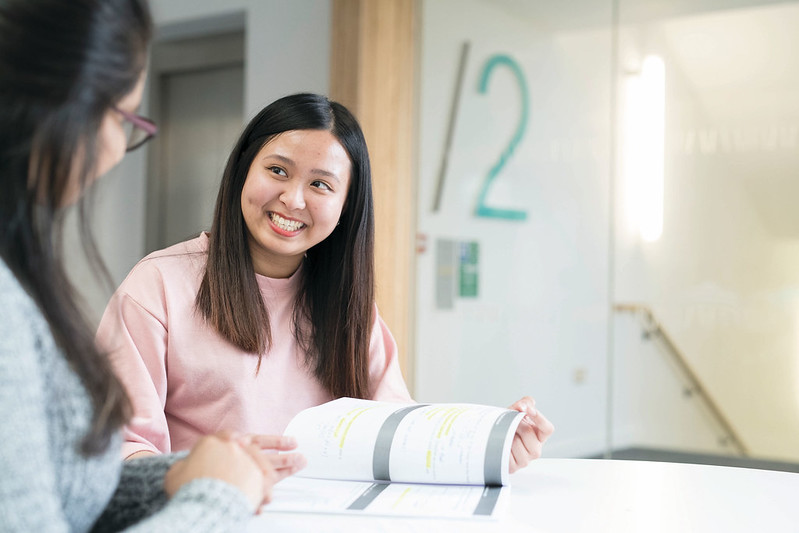Sally Mathias currently works for Ofcom, as part of their Content Policy team. The team, which focuses on policy for TV and radio broadcasting, has been looking at emerging trends in the way content is viewed (such as subscription services like Netflix, and catch-up services).
After completing a Policy Officer Higher Apprenticeship at the University of Kent in July 2021, Sally successfully applied for a higher-level Policy Adviser role at Ofcom, a role she will take up in September. We caught up with Sally to learn more about her experience as an apprentice.
Why did you choose a higher apprenticeship over a university degree?
When I left sixth form, I was the only person in my year who decided not to go to university. It would have been easy to go along with everyone else and be persuaded into going by my teachers. The main reason I decided against it was because I didn’t want to spend a lot of money studying for a degree when I didn’t know what I was going to do with it at the end. An apprenticeship offered a more direct pathway into a career, with practical on-the-job training and a job likely at the end of it – and I didn’t have to pay anything to do it. Even though it was scary to turn down the place at university, after successfully completing my apprenticeship and gaining a job that I really enjoy, I’m so pleased I made that decision!
How did you become an apprentice?
I saw the job advert and decided to apply, as I had all the desired qualifications and the role looked interesting!
Could you describe a typical day in your current role?
We work on projects which often span over a few months (sometimes even years for big projects!) so the daily work is always different depending on what stage of a project you are at. You might be doing research into an area at the start of a project, meeting with stakeholders to discuss policy change or the issues they are facing, meeting with the project team for a workshop to discuss ideas, or – if the project is at a later stage – you might be helping to draft a statement or report for publication.
Can you tell us about your experience of combining paid work with academic studies? Have there been any challenges?
One thing I found particularly tricky, and wasn’t something I’d expected to be difficult, was switching between different writing styles. For instance, when completing study work, I’d be writing an academic essay, with references to other essays and literature. This style of writing can require the need to show explanation and depth of understanding of a topic. At work, I would be drafting a report or document where I needed to be more concise or write in ‘plain English’ to make the document more accessible for people to read. Switching between the two formats of writing was challenging, but I think it improved my writing skills overall and helped in learning to write for different audiences.
The programme is delivered primarily online as a flexible distance-learning experience – can you tell us what the online learning experience was like for you?
Online learning worked well for me, as it meant I didn’t have to travel to study – I could study at home or find a quiet space in my workplace. The fact that all the content is available online meant I could complete it at my own pace on study days and spend more or less time on different topics depending on how much I understood about them. All the lecturers I had for the course were there to answer questions via email. We knew when they would run check-in sessions if we wanted to speak with them about the work, so I felt supported and able to get help when I needed it.
Is there anything you learnt in particular during your higher apprenticeship that helps you now in your day-to-day working life?
Time management! Having to split my time between work and study has been a challenge at times but it has prepared me well for when I need to manage time for two different projects or tasks at work. Overall, doing an apprenticeship means you are learning new knowledge whilst applying new skills on a daily basis. So it’s also made me feel more confident in applying new knowledge quickly and being proactive at improving new skills and participating in training activities.
Looking back, did your apprenticeship live up to your expectations? What were some of the highlights of the higher apprenticeship for you?
Policy was never something I considered as a career path, and I didn’t really know what to expect when I applied for the apprenticeship, but it’s proven to be a really interesting experience! Learning about how policy is made has been interesting. And getting experience of doing a job in policy has been challenging at times but it’s the type of job I have always wanted to have – you’re always learning new things, working on a variety of tasks, and have lots of opportunities to work with colleagues and share ideas.
In what ways has this higher apprenticeship made a difference to you and your career?
The apprenticeship has enabled me to gain a higher level qualification and this achievement, along with the training and experience I have gained in the role, has helped me gain a job I am passionate about. It has opened up a career path that looks exciting. I have the determination to progress and develop my skills.
What are your future plans/aspirations? How do you see your career progressing?
Moving into my new permanent role in September, I aim to take on some more responsibility including improving my skills in project management. I’d also like to commit some more of my time to internal organisational activities and give back some of the support that colleagues have given me over the course of my apprenticeship! I think the apprenticeship scheme is a great route into a career in policy, so I’d also like to help new apprentices on the scheme and raise awareness of what it can offer if you’re prepared to work hard.
What advice would you give to people considering a Policy Officer Higher Apprenticeship?
The prospect of doing something different can be a bit daunting, especially when people act like university is the only good option – don’t be put off by this! Think about what YOU want to do and if you’re considering the Policy Officer apprenticeship then you don’t have much to lose in applying; you can ask more questions about the role if you get an interview, you won’t have to pay for it, and it only takes two years to complete the course. Chances are you will enjoy the role, and if not then it’s more experience and another qualification gained in your pursuit to find what career you want to do! The University of Kent has been a great place to do the course. We have had support with our studies and been able to discuss the work with teachers and advisors who are experienced in teaching and giving support to higher level students and apprentices.
The Policy Officer Higher Apprenticeship at the University of Kent
Our Policy Officer Higher Apprenticeship is designed for employers looking to develop their in-house talent in policy analysis or policy advice. It’s a unique formal qualification that equips apprentices to progress in their role, whether they work within central and local government or within companies, campaign groups, charities and membership organisations that strive to influence government policy.
It combines on-the-job training with off-the-job learning as an alternative to a university foundation degree over a period of 24 months, with the option to start in September 2021 or January 2022. There are two modes of delivery on offer: one that is 100% online learning and one that also includes face-to-face teaching. On successful completion, apprentices receive a Certificate of Higher Education in Policy Studies and an Apprenticeship.
Want to know more?
For more information about the Level 4 Policy Officer Higher Apprenticeship at Kent:









